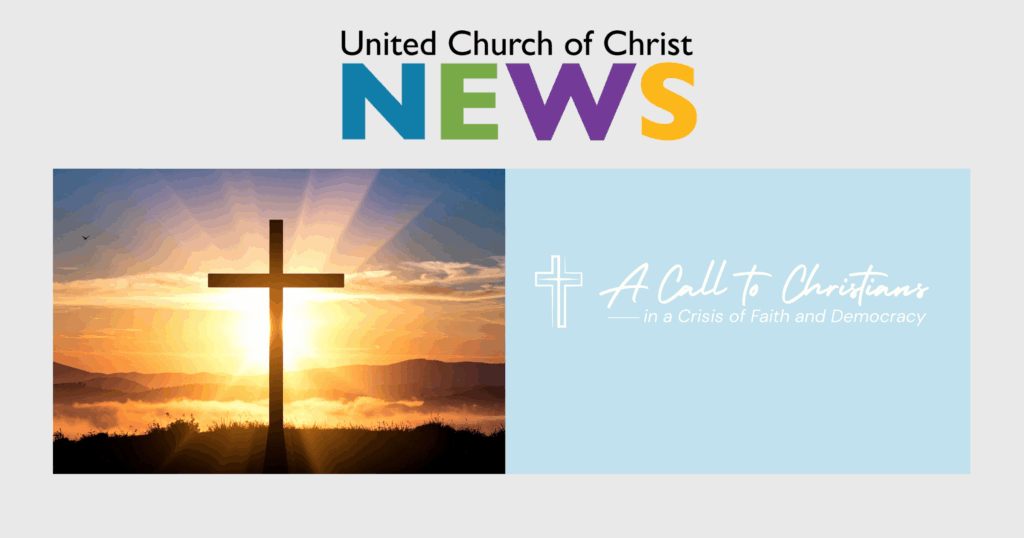Living Beyond the Numbers: A Call to the UCC’s Embodied Future
The United Church of Christ has never been a numbers-first denomination. We’ve long understood that faithfulness doesn’t always come dressed in Sunday morning attendance or perfectly balanced budgets. But in a world obsessed with quantification, it’s easy to let the narrative of decline overshadow the deeper story we are called to tell.
Rev. Karen Georgia Thompson, UCC General Minister and President/CEO offered a reflection on the state of the church that moves beyond metrics into something far more spiritual and urgent: a reckoning with who we say we are, and what we’re truly called to be.
She began with a question Jesus asked: “Who do you say that I am?” It’s an ancient inquiry, but it still echoes in the pews and pulpits of our congregations today. Because in this moment, the question isn’t only about Jesus—it’s about us.
Who do we say the UCC is? Who do others say we are?
We might list our commitments: ecumenism, justice, open doors, and open hearts. We might recall that we were early to ordain women and queer folks, quick to denounce white supremacy, often first to speak when injustice demands a response. Depending on who you ask, we are holy troublemakers, advocates, healers, organizers, or hesitant progressives still learning how to walk our talk.
But as Rev. Thompson reminded the gathered, perception is rooted in experience. And experience doesn’t always line up with vision statements or General Synod resolutions. Some only know the UCC as a place of bold liberation. Others know it as a space where racism and patriarchy persist, cloaked in politeness. Sometimes, it is both at once.
Still—hope endures here.
Not a passive hope, but a fierce, muscular kind. The kind that insists we are more than our denominational history. The kind that looks at an 80% white church and says: Our diversity is our growth edge, not our deficit. The kind that refuses to accept that institutional decline is our only future.
Because the church is not just a church of empty pews. It is the living witness of a different kind of Christianity—one that shows up in addiction counseling, mutual aid, child care, food justice, refugee accompaniment, prison visitation, and grief work. The stories of the UCC are written in casseroles and protest signs, in community fridges and quiet moments of pastoral presence that never get recorded in a metric report.
The church is being called into deeper spiritual living—a faith that does more than survive. A faith that wades into deeper water in search of the divine.
If the Gospel is good news, it’s because it shows up in real life. Not just in sermons, but in sidewalk vigils. Not just in membership rolls, but in the person who shows up to teach English as a Second Language (ESL) twice a week without ever joining the church.
Rev. Thompson said it plainly: “Flesh and blood cannot change the future.” Meaning that the kind of transformation we seek is not a human achievement, but a divine invitation. One that asks us to live into the possibility of a different future—a future where the visible unity of the church is not just a theological idea, but a lived, breathing reality.
This is what it means to be UCC in 2025.
Not perfect.
Not finished.
Not dying.
But discerning.
Alive.
Living beyond the numbers.
Watch some of her remarks below. You can view the full plenaries via the livestream LINK.
Related News
UCC GMP joins other faith leaders in endorsing ‘Call to Christians’ letter
The Rev. Karen Georgia Thompson, United Church of Christ General Minister and President/CEO...
Read MoreAshes to Ashes
Some weeks more than others the sense that the “world is burning” is hard to shake. The...
Read MoreUnited Church Homes receives $15,000 in grants to expand NaviGuide services for the elderly and their families
United Church Homes (UCH), a national nonprofit senior living organization headquartered in...
Read More


